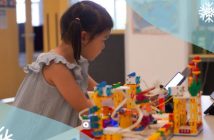 Kindermusik teacher Sarah Peel had always planned on sending her bilingual Chinese-Canadian daughter Julia to a local Chinese school. When it came time for her Julia to leave kindergarten, Peel had always assumed she would go to Fang Cao Di, a popular local school among expat families. “[Fang Cao Di’s] international section is very well known and if you go to a [Chinese] school, that’s where you go. Because my Chinese isn’t fantastic it became the easy choice, the obvious choice.” But the obvious choice isn’t always the most suitable, as Peel found out.
Kindermusik teacher Sarah Peel had always planned on sending her bilingual Chinese-Canadian daughter Julia to a local Chinese school. When it came time for her Julia to leave kindergarten, Peel had always assumed she would go to Fang Cao Di, a popular local school among expat families. “[Fang Cao Di’s] international section is very well known and if you go to a [Chinese] school, that’s where you go. Because my Chinese isn’t fantastic it became the easy choice, the obvious choice.” But the obvious choice isn’t always the most suitable, as Peel found out.
As requested by Fang Cao Di, Peel filled out all of the enrollment paperwork for her daughter, and waited for the school to call her in for an interview (the second stage of the enrollment process). “I heard people were getting calls and we hadn’t got a call. We called [the school]and they told us to wait until Monday and call back. Then the whole week they were doing interviews, their phone was off the hook. They had unplugged it.”
Like many children entering elementary school, Julia is just under the age limit for acceptance into Grade 1. Unlike international schools that are more flexible with their age cut-off, local schools are very strict: Your child must be born before midnight on August 31 and they must be 6 by September 31. This was not the case for Peel’s daughter, and she was not accepted into Fang Cao Di for this reason.
In China, you don’t graduate from a local kindergarten. Instead, parents must go to a Ministry of Education (MoE) office to obtain a certificate guaranteeing that your child is 6 years old. “That certificate, which we didn’t qualify for, is how you enroll [in elementary school]. You turn in the receipt and the school gets funding from the government for that student,” explains Peel. Interestingly, Peel’s search revealed that only Fang Cao Di required this certificate for enrollment. Most local schools simply asked Peel to hand in the document once her daughter had turned 6.
“There are a bunch of kids like Julia every year – in fact there were six kids in her [kindergarten]class who were underage. Last fall, the MoE [gave]schools permission to take children who were a little younger. Any [local]school with an international [section]could do that any way, but Fang Cao Di chooses not to,” says Peel.
Navigating local schools is particularly difficult for expat parents, with poor administration being the major complaint. “I’ve heard great things from parents about the teaching at Fang Cao Di but I don’t know of any one who’s had any success with their administration,” says Peel. “I went [to the school]and it took the person from administration ten minutes to stand up from her desk and look me in the eye.” According to Peel, Fang Cao Di has very old-fashioned methods of communicating and working with parents, but they are not the only school with this problem.
With no school for Julia to go to, and with international schools far out of Peel’s price range, Peel was forced to search for an alternative. It was late July and she had only six weeks to find a Chinese school that would accept her daughter. As some schools start accepting enrollments as early as January, she was almost six months behind other families. “There’s no way to find [local schools]aside from searching,” Peel laments.
As an educator involved in the local school system, Peel has some advice for parents of younger children seeking placements in local kindergartens. “The [MoE is] short 40,000 kindergarten spaces across the country,” says Peel. “Right now, kindergartens require parents to pay upfront and there still aren’t enough local schools.” This is because 2007 was a lucky year for Chinese couples to get married, while 2008 was a golden pig year. The result being a glut of 2-year-olds now entering kindergarten. For Chinese nationals this is a particularly difficult time, “Everybody gets a school spot, but your school might be three hours away from your home,” says Peel.
During her hunt for a new school, Peel uncovered some of the best local elementary school options for children with foreign passports. “It turns out the system is a lot more flexible than it appears on the outside.”
Ritan Elementary School
北京朝阳区日坛小学
Address: 20 Huishengyuan, Tonghuijiayuan, Chaoyang District
北京市朝阳区通惠家园惠生园20号
Website: www.bjrtxx.cn
Phone: 6558 4121
Email: ritan@126.com
English-speaking administrators: No
Tuition: RMB 13,000 per year
Ritan Elementary School is publically funded and has an international section. They share a campus with Beanstalk International School, though the campus actually belongs to Ritan Elementary. The campus itself is very nice and large, with good facilities and a great location. The school’s international section has only six students who are integrated into standard Chinese classes. Their administration doesn’t speak English easily, but Peel found that they were very encouraging about accepting Julia. However, Peel found the school to be very noisy and she was concerned about class sizes. A standard class in a Chinese elementary school is 40 students. Classes at Ritan Elementary all contained less than 20 students, however if the school had an influx of children, classes could potentially go up to 40. Peel’s impression of the school was that, providing all of your paperwork is in order, they’ll be happy to take you.
Wangjing Experimental School
北京望京实验学校
Address: 313 Third District, Wangjing Xiyuan, Chaoyang District
北京市朝阳区望京西园三区313楼
Website: N/A
Phone: 6475 9576, 6475 9571 (International section)
Email: wenxiangyu0410@126.com
English-speaking administrators : Yes
Tuition: Elementary school RMB 12,000 per year, Junior high school RMB 15,000 per year
Though Wangjing Experimental is a publically funded school it does not accept all applicants. For Peel to tour the school she was required to bring her daughter with her. This was primarily so that the administrators could confirm Julia’s Chinese was at an appropriate level. Peel felt that the school had a very formal, high-pressure atmosphere. As a traditional Chinese school, classes contained 40 students and every class was completely full. Wangjing Experimental is a popular option among Korean parents, not only for its academic reputation but also its location. The school follows a rote approach to learning that requires a lot of discipline. In addition to their elementary and junior high school, Wangjing Experimental offers boarding options. Peel felt the school staff was very nice and open; it helps that the head of their international department is bilingual (speaking both Chinese and English). Though the school has nice facilities, it is still a strict academic environment and lacks the color and fun of a Western-style school. Julia’s paperwork was in order and she could have been accepted there.
New Talent Academy
北京新英才学校
Address: 9 Anhuajie, Tianzhu Development Zone, Shunyi District
北京市顺义区天竺开发区安华街9号
Website: www.bjnewtalent.com
Phone: 8041 3001 (Admission), 8041 3037 (International section)
Email: cxz@bjnewtalent.com
English-speaking administrators: Yes
Tuition: Kindergarten RMB 50,000 per year (non-Chinese nationals), Elementary school RMB 60,000 per year (non-Chinese nationals), High school (junior and senior) RMB 70,000 per year (non-Chinese nationals).
According to admissions staff, tuition fees are all-inclusive.
When comparing New Talent, a private Chinese school, to Wangjing Experimental School, Peel points out that simply because a school is local does not mean that it comes with a smaller price tag than their international counterparts. Due to their academic reputation and Shunyi location, the school has some experience dealing with international students.
Jing Chang Experimental Primary School of Beijing, International Division
北京精诚实验小学国际部
Address: 34 Huayan Li, Chaoyang District 北京市朝阳区华颜里34号
Website: www.guojibu.jchedu.cn/cms/xxgjb/
Phone: 6428 9400, 5209 1066 (International section)
Email address: N/A
English-speaking administrators: No
Tuition: RMB 26,600 per year
Jing Chang Experimental is a private Chinese school and after much searching, this is where Peel finally enrolled her daughter. Despite being a Chinese school, they have a guaranteed class size of 20 students per class. Peel did not feel rushed during her tour and the administrators were happy to answer all of her questions. Peel found the environment to be quiet and respectful, and she didn’t hear any yelling. The school allows boarders, but only approximately 20 percent of students live on campus. For kids living off campus, there is a school bus service. When Peel took her daughter to visit the campus, the staff paired her with another student, who was also Chinese-Canadian. The student then took Julia around the school to show her the various facilities. During the tour Peel was able to visit classes as they were in session. Following the tour, the staff gave Julia dinner in the dining hall. Jing Chang Experimental has a focus on English, with eight English language classes per week. It also has a relationship with a school in England: Together they run a teacher exchange program, giving students access to native-English speakers.
Other schools Peel visited include:
Beijing Normal University
Asia Pacific Experimental School
北师大附属亚太实验学校
Address: South of Beilitanglu, Tiantongyuan, Changping District 北京市昌平区天通苑北立汤路东侧(北京太阳城东侧)
Website: www.yataischool.net
Phone: 6975 9602/3
Email: N/A
English-speaking administrators: No
Tuition: Elementary school RMB 19,000 per year (day student), RMB 23,000 per year (boarder); Junior high school RMB 23,000 (day student), RMB 27,000 per year (boarder)
Huijia Kindergarten
北京汇佳幼儿园
Address: 33C, Building B, Huating Jiayuan, 6 Beisihuan Zhonglu, Chaoyang District (other campus locations available)
北京市朝阳区北四环中路6号华亭嘉园B座33C
Website: www.hjkids.com
Phone: 400 886 1993 (Switchboard), 5165 2252 ext 610, 605 (Head office)
Email: hjkids@263.net
English-speaking administrators: Yes
Tuition: RMB 15,000-70,000 per year (depending on the campus)
Qinghua University Kindergarten
and Elementary School
清华大学附属幼儿园和小学
Address: Qinghua University, Haidian District
北京市海淀区清华大学内
Website: www.qhfx.edu.cn
Phone: 6278 5001 (Qinghua University switchboard), 6278 2180/1414 (Kindergarten), 6278 2241 (Elementary school)
Email: info@qinghua.edu.cn
English-speaking administrators: No
Tuition: Administration staff would not offer their tuition costs as admission is only open to children of Qinghua University staff. However, in some cases the school offers places to members of the general public. Contact the school for more information.
 Things to Consider When Going Local:
Things to Consider When Going Local:
1. What are the teachers’ qualifications?
2. Observe the teaching staff. Are they all very young and appear inexperienced?
3. What is the school schedule? Chinese schools do not break for Christmas and other international holidays.
4. Can you remove your child from class for a vacation?
5. If your Chinese isn’t good, how does the school plan on communicating with you?
6. What are the homework expectations? Ask to see the type and amount of homework typically given.
7. What is the school’s policy if a child doesn’t complete their homework?
8. Why are you sending your child to a Chinese school and is it worth it?
9. Chinese schools teach a Chinese curriculum. Are you okay with your child being taught the Chinese version of history and singing the Chinese national anthem every morning?
10. Can you speak to a current English-speaking parent at the school?
Why Peel Chose a Local School:
“Julia is half Chinese, which means she needs to know how to live and work and be a part of Chinese society. Our home environment is very English. Academically, she needs to learn how to read and write Chinese, and there will never be an easier time for her to do that [than when she’s young]. She probably won’t finish school in the Chinese system. Part of being bicultural is being able to move between two cultures comfortably, and you can’t do that without the help of the community. The role of schools is not necessarily about education – yes, the content you learn is important, but there’s another significant aspect that teaches community expectations and standards. A lot of that is connected to language, and culture is connected to language. For eight hours a day, she will be in a Chinese environment [where she]will have those [Chinese] expectations.”



